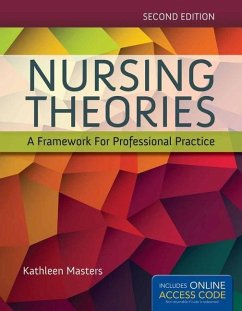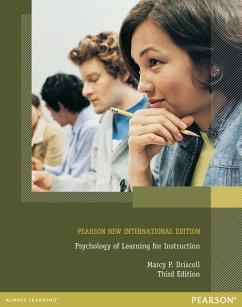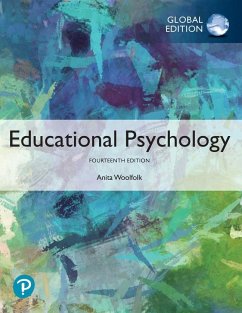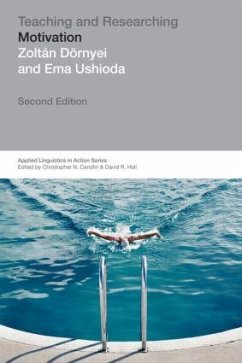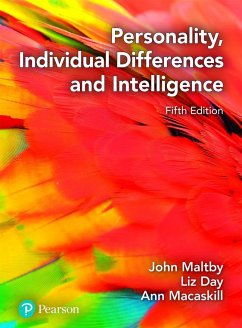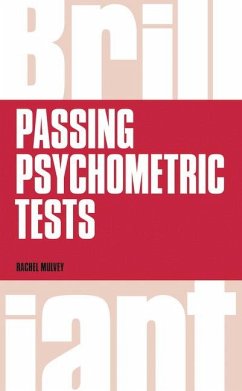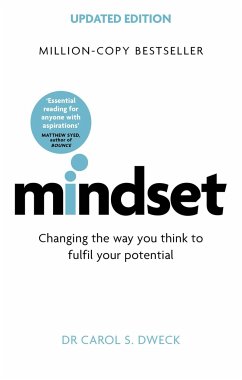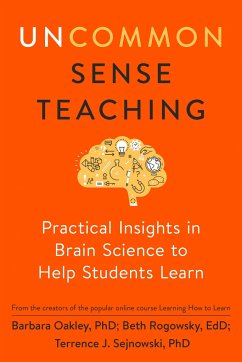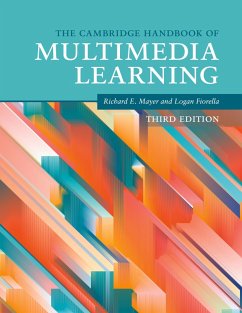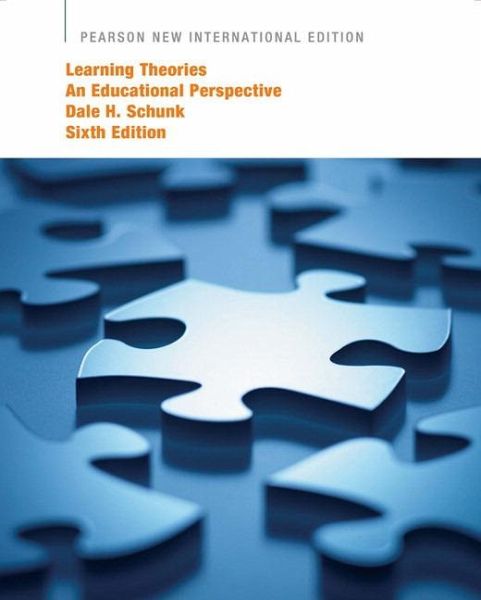
Learning Theories: An Educational Perspective
Pearson New International Edition

PAYBACK Punkte
54 °P sammeln!
For Learning Theory/Cognition and Instruction, Advanced Educational Psychology, and Introductory Educational Psychology courses.
An essential resource for understanding the main principles, concepts, and research findings of key learning theories –especially as they relate to education–this proven text blends theory, research, and applications throughout, providing its readers with a coherent and unified perspective on learning in educational settings.
Features + Benefits
This text’s main objectives are to inform students about the main principles, concepts, and research findings of key theories of learning, especially as they relate to education, and to provide applications of principles and concepts in settings where teaching and learning occur. Although the text places primary emphasis on cognitive theories that stress learners’ constructions of beliefs, skills, strategies, and knowledge, behavioral theories also are discussed.
An introductory chapter introduces learning, discusses key learning issues and ways to assess learning, explains the relation of learning and instruction, and describes some historical antecedents of contemporary learning theories. A second chapter follows which discusses the neuroscience of learning. The next four chapters present theories of learning: behaviorism, social cognitive theory, information processing theory, and constructivism. The last four chapters in the text cover key topics related to learning: cognitive learning processes, motivation, self-regulation, and development.
By blending theory, research, and applications throughout, this text provides instructors and students with a coherent and unified perspective on learning in educational settings.
Features a chapter on the Neuroscience of Learning (Chapter 2) so students can better understand the basics of brain operation and the roles of brain structures in learning.
A chapter on Constructivism (Chapter 6) helps students to understand key constructivist principles, especially those relevant to Vygotsky’s theory, and how to foster constructivist learning environments.
The chapter on Motivation (Chapter 8) explains how motivational processes influence teaching and learning and how educators can develop motivated learners.
A chapter on Development (Chapter 10) teaches about the developmental processes critical for learning and successful ways to foster learning in students at different developmental levels.
The chapter on Cognitive Learning Processes (Chapter 7) aids students’ understanding of the key roles played by metacognition, concept learning, problem-solving, transfer, and technology in teaching and learning. Table of Contents
Chapter 1 — Introduction to the Study of Learning
Learning Defined
Precursors of Modern Learning Theories
Learning theory and philosophy
Beginnings of the psychological study of learning
Structuralism and functionalism
Learning Theory and Research
Functions of theory
Conducting research
Assessment of Learning
Direct observations
Written responses
Oral responses
Ratings by others
Self-reports
Relation of Learning and Instruction
Historical perspective
Instructional commonalities
Integration of theory and practice
Critical Issues for Learning Theories
How does learning occur?
What is the role of memory?
What is the role of motivation?
How does transfer occur?
Which processes are involved in self-regulation?
What are the implications for instruction?
Three Learning Scenarios
Kathy Stone’s third-grade class
Jim Marshall’s U. S. History class
Gina Brown’s educational psychology class
Summary
Further Reading
Chapter 2 — Behaviorism
Connectionism
Trial-and-error learning
Laws of exercise and effect
Other principles
Revisions to Thorndike’s theory
Instructional applications
Classical Conditioning
Basic processes
Informational variables
Biological influences
Conditioned emotional reactions
Contiguous Conditioning
Acts and movements
Associative strength
Rewards and punishments
Habit formation and change
Operant Conditioning
Conceptual framework
Basic processes
Behavioral change
Behavior modification
Self-regulation
Instructional Applications
Behavioral objectives
Learning time
Mastery learning
Programmed instruction
Contingency contracts
Summary
Further Reading
Chapter 3 — Neuroscience of Learning
Organization and Structures
Neural organization
Brain structures
Localization and interconnections
Brain research methods
Neurophysiology of Learning
Information processing system
Memory networks
Language learning
Brain Development
Influential factors
Phases of development
Critical periods
Language development
Motivation and Emotions
Motivation
Emotions
Instructional Applications
Relevance of brain research
Educational issues
Brain-based educational practices
Summary
Further Reading
Chapter 4 — Information Processing Theory
Information Processing System
Assumptions
Two-store (dual-memory) model
Alternatives to the two-store model
Attention
Theories of attention
Attention and learning
Attention and reading
Perception
Gestalt theory
Sensory registers
LTM comparisons
Two-Store Memory Model
Verbal learning
Short-term (working) memory
Long-term memory
Influences on encoding
Long-Term Memory: Storage
Propositions
Storage of knowledge
Production systems and connectionist models
Long-Term Memory: Retrieval and Forgetting
Retrieval
Language comprehension
Forgetting
Mental Imagery
Representation of spatial information
Imagery in LTM
Individual differences
Instructional Applications
Advance organizers
Conditions of learning
Cognitive load
Summary
Further Reading
Chapter 5 — Social Cognitive Theory
Conceptual Framework for Learning
Reciprocal interactions
Enactive and vicarious learning
Learning and performance
Self-regulation
Modeling Processes
Theories of imitation
Functions of modeling
Cognitive skill learning
Motor skill learning
Influences on Learning and Performance
Developmental status of learners
Model prestige and competence
Vicarious consequences to models
Motivational Processes
Goals
Outcome expectations
Values
Self-Efficacy
Conceptual overview
Self-efficacy in achievement situations
Models and self-efficacy
Motor skills
Instructional self-efficacy
Health and therapeutic activities
Instructional Applications
Models
Self-efficacy
Worked examples
Tutoring and mentoring
Summary
Further Reading
Chapter 6 — Constructivism
Constructivism: Assumptions and Perspectives
Overview
Perspectives
Situated cognition
Contributions and applications
Piaget’s Theory of Cognitive Development
Developmental processes
Implications for instruction
Vygotsky’s Sociocultural Theory
Background
Basic principles
Zone of Proximal Development
Applications
Critique
Private Speech and Socially-Mediated Learning
Private speech
Verbalization and achievement
Socially mediated learning
Self-regulation
Motivation
Contextual factors
Implicit theories
Teachers’ expectations
Constructivist Learning Environments
Key features
APA Learner-Centered Principles
Instructional Applications
Discovery learning
Inquiry teaching
Peer-assisted learning
Discussions and debates
Reflective teaching
Summary
Further Reading
Chapter 7 — Cognitive Learning Processes
Skill Acquisition
General and specific skills
Novice-to-expert research methodology
Expert-novice differences in science
Conditional Knowledge and Metacognition
Conditional knowledge
Metacognition and learning
Variables influencing metacognition
Metacognition and behavior
Metacognition and re
An essential resource for understanding the main principles, concepts, and research findings of key learning theories –especially as they relate to education–this proven text blends theory, research, and applications throughout, providing its readers with a coherent and unified perspective on learning in educational settings.
Features + Benefits
This text’s main objectives are to inform students about the main principles, concepts, and research findings of key theories of learning, especially as they relate to education, and to provide applications of principles and concepts in settings where teaching and learning occur. Although the text places primary emphasis on cognitive theories that stress learners’ constructions of beliefs, skills, strategies, and knowledge, behavioral theories also are discussed.
An introductory chapter introduces learning, discusses key learning issues and ways to assess learning, explains the relation of learning and instruction, and describes some historical antecedents of contemporary learning theories. A second chapter follows which discusses the neuroscience of learning. The next four chapters present theories of learning: behaviorism, social cognitive theory, information processing theory, and constructivism. The last four chapters in the text cover key topics related to learning: cognitive learning processes, motivation, self-regulation, and development.
By blending theory, research, and applications throughout, this text provides instructors and students with a coherent and unified perspective on learning in educational settings.
Features a chapter on the Neuroscience of Learning (Chapter 2) so students can better understand the basics of brain operation and the roles of brain structures in learning.
A chapter on Constructivism (Chapter 6) helps students to understand key constructivist principles, especially those relevant to Vygotsky’s theory, and how to foster constructivist learning environments.
The chapter on Motivation (Chapter 8) explains how motivational processes influence teaching and learning and how educators can develop motivated learners.
A chapter on Development (Chapter 10) teaches about the developmental processes critical for learning and successful ways to foster learning in students at different developmental levels.
The chapter on Cognitive Learning Processes (Chapter 7) aids students’ understanding of the key roles played by metacognition, concept learning, problem-solving, transfer, and technology in teaching and learning. Table of Contents
Chapter 1 — Introduction to the Study of Learning
Learning Defined
Precursors of Modern Learning Theories
Learning theory and philosophy
Beginnings of the psychological study of learning
Structuralism and functionalism
Learning Theory and Research
Functions of theory
Conducting research
Assessment of Learning
Direct observations
Written responses
Oral responses
Ratings by others
Self-reports
Relation of Learning and Instruction
Historical perspective
Instructional commonalities
Integration of theory and practice
Critical Issues for Learning Theories
How does learning occur?
What is the role of memory?
What is the role of motivation?
How does transfer occur?
Which processes are involved in self-regulation?
What are the implications for instruction?
Three Learning Scenarios
Kathy Stone’s third-grade class
Jim Marshall’s U. S. History class
Gina Brown’s educational psychology class
Summary
Further Reading
Chapter 2 — Behaviorism
Connectionism
Trial-and-error learning
Laws of exercise and effect
Other principles
Revisions to Thorndike’s theory
Instructional applications
Classical Conditioning
Basic processes
Informational variables
Biological influences
Conditioned emotional reactions
Contiguous Conditioning
Acts and movements
Associative strength
Rewards and punishments
Habit formation and change
Operant Conditioning
Conceptual framework
Basic processes
Behavioral change
Behavior modification
Self-regulation
Instructional Applications
Behavioral objectives
Learning time
Mastery learning
Programmed instruction
Contingency contracts
Summary
Further Reading
Chapter 3 — Neuroscience of Learning
Organization and Structures
Neural organization
Brain structures
Localization and interconnections
Brain research methods
Neurophysiology of Learning
Information processing system
Memory networks
Language learning
Brain Development
Influential factors
Phases of development
Critical periods
Language development
Motivation and Emotions
Motivation
Emotions
Instructional Applications
Relevance of brain research
Educational issues
Brain-based educational practices
Summary
Further Reading
Chapter 4 — Information Processing Theory
Information Processing System
Assumptions
Two-store (dual-memory) model
Alternatives to the two-store model
Attention
Theories of attention
Attention and learning
Attention and reading
Perception
Gestalt theory
Sensory registers
LTM comparisons
Two-Store Memory Model
Verbal learning
Short-term (working) memory
Long-term memory
Influences on encoding
Long-Term Memory: Storage
Propositions
Storage of knowledge
Production systems and connectionist models
Long-Term Memory: Retrieval and Forgetting
Retrieval
Language comprehension
Forgetting
Mental Imagery
Representation of spatial information
Imagery in LTM
Individual differences
Instructional Applications
Advance organizers
Conditions of learning
Cognitive load
Summary
Further Reading
Chapter 5 — Social Cognitive Theory
Conceptual Framework for Learning
Reciprocal interactions
Enactive and vicarious learning
Learning and performance
Self-regulation
Modeling Processes
Theories of imitation
Functions of modeling
Cognitive skill learning
Motor skill learning
Influences on Learning and Performance
Developmental status of learners
Model prestige and competence
Vicarious consequences to models
Motivational Processes
Goals
Outcome expectations
Values
Self-Efficacy
Conceptual overview
Self-efficacy in achievement situations
Models and self-efficacy
Motor skills
Instructional self-efficacy
Health and therapeutic activities
Instructional Applications
Models
Self-efficacy
Worked examples
Tutoring and mentoring
Summary
Further Reading
Chapter 6 — Constructivism
Constructivism: Assumptions and Perspectives
Overview
Perspectives
Situated cognition
Contributions and applications
Piaget’s Theory of Cognitive Development
Developmental processes
Implications for instruction
Vygotsky’s Sociocultural Theory
Background
Basic principles
Zone of Proximal Development
Applications
Critique
Private Speech and Socially-Mediated Learning
Private speech
Verbalization and achievement
Socially mediated learning
Self-regulation
Motivation
Contextual factors
Implicit theories
Teachers’ expectations
Constructivist Learning Environments
Key features
APA Learner-Centered Principles
Instructional Applications
Discovery learning
Inquiry teaching
Peer-assisted learning
Discussions and debates
Reflective teaching
Summary
Further Reading
Chapter 7 — Cognitive Learning Processes
Skill Acquisition
General and specific skills
Novice-to-expert research methodology
Expert-novice differences in science
Conditional Knowledge and Metacognition
Conditional knowledge
Metacognition and learning
Variables influencing metacognition
Metacognition and behavior
Metacognition and re
For Learning Theory/Cognition and Instruction, Advanced Educational Psychology, and Introductory Educational Psychology courses. An essential resource for understanding the main principles, concepts, and research findings of key learning theories ?especially as they relate to education?this proven text blends theory, research, and applications throughout, providing its readers with a coherent and unified perspective on learning in educational settings.
Dieser Artikel kann nur an eine deutsche Lieferadresse ausgeliefert werden.




